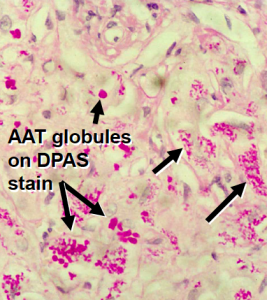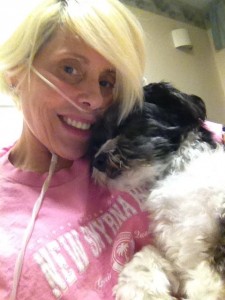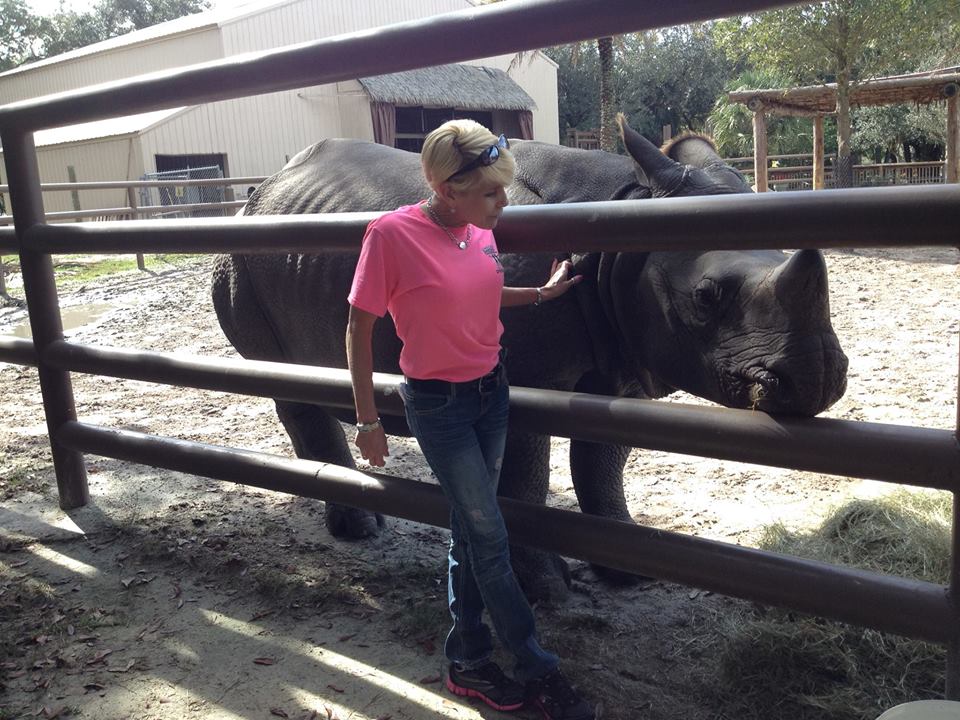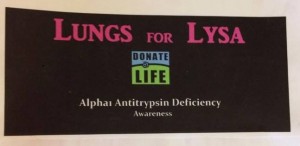Lung transplant hopeful Lysa Dilley: ‘I just want to breathe again’
Veterinary medicine student Lysa Dilley makes a new friend in Florida, shortly before her latest hospital stay.
The picture window in her fifth floor room at Johns Hopkins hospital affords Lysa Dilley a panoramic view of the morning sunrise. And with each new day, Lysa believes she is drawing closer to a second chance at life.
At age 32, the Walkersville, Maryland resident was diagnosed with a rare genetic disease, called Alpha-1 Antitrypsin Deficiency. Tests revealed that her respiratory system was only functioning at 41%.
Alpha-1 was first identified in 1963, but it is unclear how many people are effected by AAT deficiency. The National Institute of Health reports, “Many people who have the condition may not know they have it. Estimates of how many people have AAT deficiency range from about 1 in every 1,600 people to about 1 in every 5,000 people.”

“I used to smoke,” said Lysa, “and the doctor would tell me, ‘You have the lungs of an 85 year old’. I’d say, ‘You’re just telling me that because you want me to stop smoking.’ But after I finally quit, I knew that something was still not right. I was always short of breath. The doctor said he wanted me to get a blood test for Alpha-1. That’s a disease which strikes people in their 30’s. I looked it up, and I couldn’t believe that I had something like that, so I had tests done for a bunch of other things first, such as a blood clot or cancer. The very last test I had done was for Alpha-1, and it was finally confirmed.
“It was shocking. It rocked my family. There is no cure for what I have, and I will need a double lung transplant in order to stay alive. When I asked the doctor, ‘What do I have to look forward to?’, his response was, ‘Well…Nothing’.”
“Clearly, he doesn’t know who he’s dealing with!”
Strong words, considering her life-changing diagnosis. But then, Lysa Dilley has been beating the odds since the day she was born.
“I was born three months early and only weighed two pounds. They said I wasn’t going to live, and if I did, I would either be retarded or sick for the rest of my life. So I don’t see this transplant process as being any different than anything else I’ve overcome over the years.
“That’s why I don’t really freak out when I think about it. I feel like where the mind goes, the man follows. If you think about it and talk about it, it becomes your reality. I choose to think about being healthy and not being sick. It’s not that I’m in denial. I just don’t focus on the disease. That’s what keeps me strong and happy and functioning, and doing what I do.

Talking with Dilley, one cannot help but be impressed by her resounding inner strength. Perhaps that’s not surprising, given she spent thirty years defining her petite physique with barbells.
Lysa was just 17 when she got into body-building; drawing inspiration from six-time Ms. Olympia – Cori Everson.
“I just started going to the gym every day and working out. I loved body-building and was good at it, so it became my lifestyle. It used to get on my nerves that people would ask me, ‘How much can you bench?’ Of course, now they don’t ask me if I lift weights anymore and that bothers me.
“2010 was when I finally had to stop lifting weights. My very last competition I got 1st Place in all three of my events. I earned my pro card, and then I retired. Competing with (by then) only 38% lung capacity gave me a chance to spread awareness for this rare disease.
“Now, doing ten ballet squats while holding onto my dresser is a struggle. But it’s fortunate that I spent all of those years in the gym, because I wouldn’t be a candidate for a transplant if the rest of my body wasn’t as healthy as it is.”
Prior to her latest set-back, Lysa had a life-plan in place. This past winter – at age 48 – she enrolled in a program at Frederick Community College with her eye set on eventually getting a degree in veterinary medicine/Zoology. After that, she figured she would find a job in her chosen field and get a lung transplant as the circumstances warranted. But contracting a virus in March knocked her for another loop, and an eleven day stay at Frederick Memorial Hospital proceeded her move to Johns Hopkins.
The hospital stays may have kept her out of the classroom, but they haven’t tempered her scholastic drive or interfered too much with her blog.
“My very first assignment in English class was to do an exploring blog, so I started writing Lungs for Lysa – A proactive conversation about rare disease, organ donation/transplantations and living your dreams despite the circumstances.
“It’s over the top, but my teacher did say to be creative. And everyone was blown away – people would ask, ‘Is that you?? I can’t believe your attitude about all you’re going through.’
“Yeah, I’m sick, so I’m just going to deal with it and pursue my goals.
“After my diagnosis, I started on this drug which cost sixty-five hundred dollars a month. I’ve been getting that since 2003. I basically just try and stay as healthy as I can. I’ve been seeing the lung transplant team here at Hopkins since 2006. Ever since then, it’s been the waiting game to get sick enough to justify the operation. You have to be sick enough that it’s a last ditch effort to save your life.
“The average life expectancy after transplant is five years. I acknowledge that fact statistically, but frankly, I don’t like to limit myself.”

Lysa’s stay at Johns Hopkins has included an entire laundry list of tests.
“They have to do that to make sure that everything is perfect except for the organ they are transplanting. If not, you probably won’t survive the surgery.
“It’s a long process. All of the doctors who were involved in the various tests have to write their reports and then submit them to the transplant team. Then they all confer. If there is anything as small as an issue with a liver enzyme, then I’m not a candidate for a transplant.
“If all goes well, then they will put me on a list. Once you’re on the list, the sickest people get their lungs first. It’s a scoring system. The higher you are on the scoring system, the more of a priority you are for a new organ. I hope I fall somewhere on the list between three months and two years. This is something I’ve been preparing for, so physically, mentally, emotionally and spiritually, I’m ready to go. I’m ready to venture into the next phase of this disease. It’s just waiting now; wait and see.”
Lysa said her preparations for the transplant surgery have included getting her financial and legal house in order. She has also put together a folio with everything related to her medical history.
To prep family and friends, she has asked them to watch a film called ‘65 Redroses’ which tells the story about a girl with cystic fibrosis who undergoes a lung transplant. And she’s paid for obedience training for her dog, Cooper.

“He’s five, and we have a very co-dependent relationship. I know that, after the operation, he needs to be respectful of my situation and be obedient – no matter who is giving the command. We go to classes every week to reinforce the training, so when the time comes, everyone will be ready – even my dog.
“I still need to gather a support team for when I’m released after the operation. Maybe someone who can move in with me for a while. That support is crucial, because the pills I’ll be on must be taken at exact intervals.
“I’ll be on anti-rejection drugs for the rest of my life. That will be somewhere between 65 – 160 pills a day for the rest of my life. They kill your immune system, so your body doesn’t naturally reject the transplanted organs. As a result of that, I won’t be able to garden because of the mold; I won’t be able to do the dirty work at the zoo because of the poop; all kinds of crazy things you’d never think of! But it will be worth it, because I’ll be able to swim and blow the air out of my nose when I dive in the water. I’ll be able to blow the candles out on my birthday cake. I can’t do that now. Having lived with this for so long, I’ve forgotten what that’s like.
“When I got here (Johns Hopkins) and I was really sick, I was afraid to go to sleep, because if I stopped focusing on every single breath, I feared I wouldn’t wake up. It was the scariest thing I’ve ever experienced. I’m used to being out of breath, but that was a whole new level of awareness.
“You just breathe, and you don’t even think about it; but when you can’t breathe, that is all you can think about.”
(Shortly after we conducted this interview, Lysa Dilley was released from Johns Hopkins Hospital. She will return at the end of April to meet with the transplant team. If all goes well, Lysa will then be put on the waiting list and, in her words, get “a second chance at life.” Follow Lysa at her blog and consider visiting her Facebook fundraising page.)

Anthony C. Hayes is an actor, author, raconteur, rapscallion and bon vivant. A one-time newsboy for the Evening Sun and professional presence at the Washington Herald, Tony’s poetry, photography, humor, and prose have also been featured in Smile, Hon, You’re in Baltimore!, Destination Maryland, Magic Octopus Magazine, Los Angeles Post-Examiner, Voice of Baltimore, SmartCEO, Alvarez Fiction, and Tales of Blood and Roses. If you notice that his work has been purloined, please let him know. As the Good Book says, “Thou shalt not steal.”



thank you John and thank you Anthony Hayes.
Good luck, Lysa. 7+ years post double lung transplant as a result of Alpha-1. Every day a gift. Be strong, stay active and healthy. I’m pulling for you!